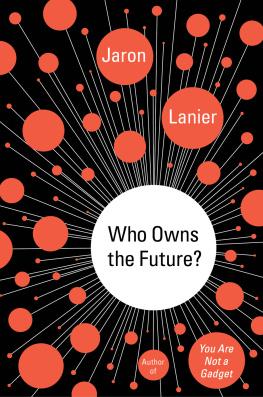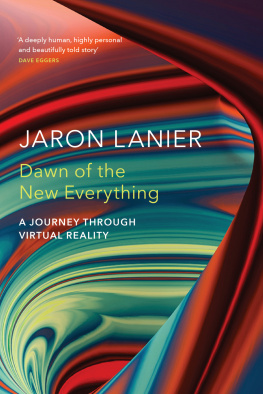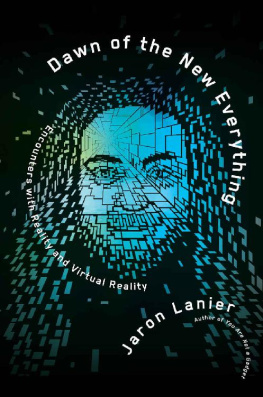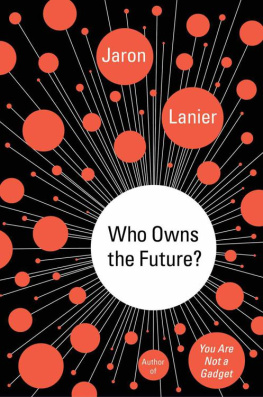Thank you for downloading this Simon & Schuster eBook.
Join our mailing list and get updates on new releases, deals, bonus content and other great books from Simon & Schuster.
C LICK H ERE T O S IGN U P
or visit us online to sign up at
eBookNews.SimonandSchuster.com
Contents
To everyone my daughter will know as she grows up.
I hope she will be able to invent her place in a world in which its normal to find success and fulfillment.
Prelude
Hello, Hero
An odd thing about this book is that you, the reader, and I, the author, are the immediate protagonists. The very action of reading makes you the hero of the story I am telling. Maybe you bought, or stole, a physical copy, paid to read this on your tablet, or pirated a digital copy off a share site. Whatever the prequel, here you are, living precisely the circumstances described in this book.
If you paid to read this, thank you! This book is a result of living my life as I do, which I hope provides value to you. The hope of this book is that someday well all have more ways to grow wealth as a side effect of living our lives creatively and intelligently, with an eye to doing things of use to others.
If you paid to read, then there has been a one-way transaction in which you transferred money to someone else.
If you got it for free, there has been a no-way transaction, and any value traded will be off the books, recorded not in any ledger but rather in the informal value systems of reputation, karma, or other wispy forms of barter. That doesnt mean nothing has happened. Maybe youll get some positive strokes over a social network because of what you say about the book. That sort of activity might benefit us both. But its a kind of benefit that is unreliable and perishable.
The clamor for online attention only turns into money for a token minority of ordinary people, but there is another new, tiny class of people who always benefit. Those who keep the new ledgers, the giant computing services that model you, spy on you, and predict your actions, turn your life activities into the greatest fortunes in history. Those are concrete fortunes made of money.
This book promotes a third alternative, which is that digital networking ought to promote a two-way transaction, in which you benefit, concretely, with real money, as I do. I want digital networking to cause more value from people to be on the books, rather than less. When we make our world more efficient through the use of digital networks, that should make our economy grow, not shrink.
Heres a current example of the challenge we face. At the height of its power, the photography company Kodak employed more than 140,000 people and was worth $28 billion. They even invented the first digital camera. But today Kodak is bankrupt, and the new face of digital photography has become Instagram. When Instagram was sold to Facebook for a billion dollars in 2012, it employed only thirteen people.
Where did all those jobs disappear to? And what happened to the wealth that those middle-class jobs created? This book is built to answer questions like these, which will only become more common as digital networking hollows out every industry, from media to medicine to manufacturing.
Instagram isnt worth a billion dollars just because those thirteen employees are extraordinary. Instead, its value comes from the millions of users who contribute to the network without being paid for it. Networks need a great number of people to participate in them to generate significant value. But when they have them, only a small number of people get paid. That has the net effect of centralizing wealth and limiting overall economic growth.
Instead of enlarging our overall economy by creating more value that is on the books, the rise of digital networking is enriching a relative few while moving the value created by the many off the books.
By digital networking I mean not only the Internet and the Web, but also other networks operated by outfits like financial institutions and intelligence agencies. In all these cases, we see the phenomenon of power and money becoming concentrated around the people who operate the most central computers in a network, undervaluing everyone else. That is the pattern we have come to expect, but it is not the only way things can go.
The alternative introduced in this book is not a utopian idea; it wont be hard to foresee its annoyances and messiness. However, I will argue that monetizing more of whats valuable from ordinary people, who turn out to be the uncompensated sources of the data that make networks valuable in the first place, will lead to a better future.
That will make power and clout more honestly distributed, and might even lead to a persistent middle class in an information economy, which would otherwise be an impossible goal.
Terms
It would be impossible to only use preexisting terminology to communicate the ideas in this book. The problem is not that there are no relevant, familiar terms, but that all the preexisting terms have baggage or common uses that are just enough askew from what I need to say that they bring more confusion than clarity. So unfamiliar terms and expressions will appear. An appendix contains a list of some of these terms, along with the pages on which they first appear. Think of it as the high-priority index.
PART ONE

First Round
CHAPTER 1
Motivation
The Problem in Brief
Were used to treating information as free, but the price we pay for the illusion of free is only workable so long as most of the overall economy isnt about information. Today, we can still think of information as the intangible enabler of communications, media, and software. But as technology advances in this century, our present intuition about the nature of information will be remembered as narrow and shortsighted. We can think of information narrowly only because sectors like manufacturing, energy, health care, and transportation arent yet particularly automated or net-centric.
As exemplified by free consumer Internet services, or the way financial services firms can often gather and use data without having to pay for it.
But eventually most productivity probably will become software-mediated. Software could be the final industrial revolution. It might subsume all the revolutions to come. This could start to happen, for instance, once cars and trucks are driven by software instead of human drivers, 3D printers magically turn out what had once been manufactured goods, automated heavy equipment finds and mines natural resources, and robot nurses handle the material aspects of caring for the elderly. (These and other examples will be explored in detail later on.) Maybe digital technology wont advance enough in this century to dominate the economy, but it probably will.
Maybe technology will then make all the needs of life so inexpensive that it will be virtually free to live well, and no one will worry about money, jobs, wealth disparities, or planning for old age. I strongly doubt that neat picture would unfold.
Instead, if we go on as we are, we will probably enter into a period of hyper-unemployment, and the attendant political and social chaos. The outcome of chaos is unpredictable, and we shouldnt rely on it to design our future.
The wise course is to consider in advance how we can live in the long term with a high degree of automation.
Next page










